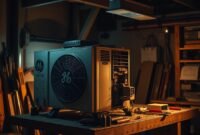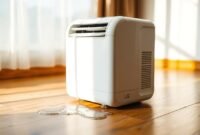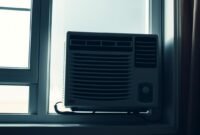Ever had your AC compressor turn off after just a few seconds? It’s a real bummer. This issue can make your home feel like a sauna instead of a cool retreat.
When this happens, your AC can’t cool the air properly. This leaves you feeling hot and worried about damage to your system.
But there’s no need to worry! I’ll show you the common reasons and how to fix them. Knowing this can save you time, money, and stress.
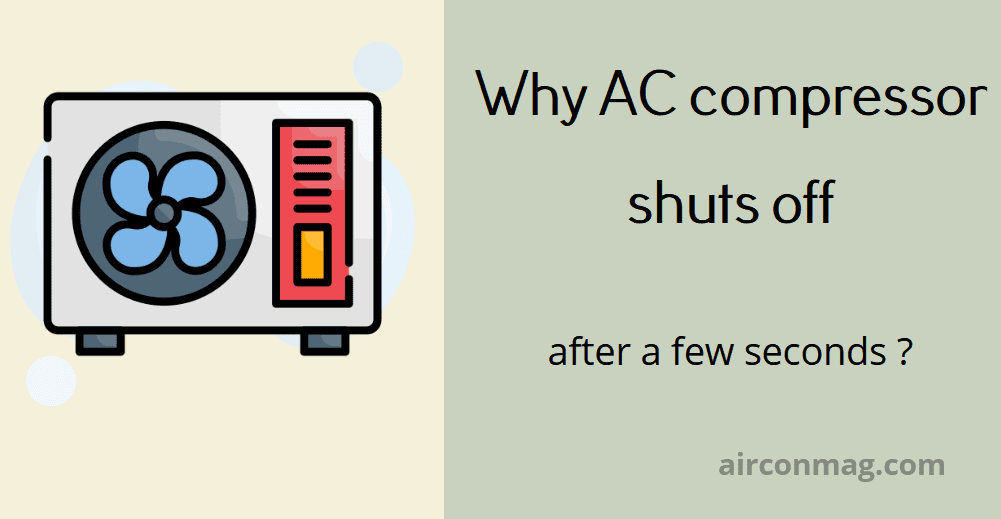
Understanding Your AC Compressor’s Basic Function and Operation
Your air conditioning system is a complex machine with the compressor at its heart. I’ll explain how it works to keep your home cool on hot days. It manages the outdoor temperature and prevents overheating.
The AC compressor does several important jobs in your cooling system. It’s like a strong pump that moves refrigerant and changes its state. This change is essential for cooling your indoor spaces.
Role of the Compressor in Cooling System
The compressor has a few main jobs:
- It presses refrigerant to help transfer heat.
- It changes refrigerant from gas to liquid.
- It helps the cool mode work.
- It manages heat exchange.
Normal Operation Cycle
The AC compressor goes through a regular cycle. It starts by pulling in low-pressure refrigerant gas. Then, it compresses it into a high-pressure state. This makes heat, which is then sent outside your home.
Signs of Compressor Problems
Spotting issues early can stop big problems. Look out for these signs:
- Strange noises when it’s running.
- It turns on and off too much.
- Cooling isn’t consistent.
- It uses more energy than usual.
Knowing how your AC compressor works helps keep your home comfy. It also helps you catch problems before they get worse.
Common Causes of Short Cycling in AC Systems
Short cycling in air conditioning systems is a big problem for homeowners. It happens when your AC unit turns on and off too fast. This stops it from cooling properly and strains the system.
Several key factors can cause short cycling in your AC unit:
- Refrigerant leak causing low refrigerant charge
- Electrical issue disrupting system communication
- Improper system sizing
- Malfunctioning thermostat
A refrigerant leak can really hurt your AC’s performance. When refrigerant levels drop, the compressor has trouble keeping the right pressure. This leads to the AC turning on and off too quickly. It makes cooling less effective and can damage your system’s parts.
Electrical problems are another common reason for short cycling. Issues like faulty wiring, damaged capacitors, or problems with the control board can mess up the AC’s cycle. This makes the compressor turn off too soon.
Knowing what can cause short cycling helps homeowners fix AC problems early. Regular maintenance and checks by professionals can stop short cycling. This helps your air conditioning system last longer.
AC Compressor Shuts Off After a Few Seconds: Primary Issues
When your air conditioning system starts acting up, knowing why can save you time and money. Several key problems can make your AC compressor turn off too soon. This can mess up your home’s comfort and even cause more damage.
An AC system needs precise electrical connections and communication. Even small problems can cause big issues, like compressor failure.
Electrical Connection Problems
Electrical issues often lead to compressor failure. Bad wiring can cut off power, making the compressor stop quickly. Look for these electrical trouble spots:
- Frayed or damaged electrical wires
- Loose connection points at the compressor
- Corroded electrical terminals
- Faulty capacitor
Pressure Switch Malfunctions
Pressure switches are key to your AC system’s safety. If they go wrong, they can make the compressor turn off unexpectedly. This happens even if the system pressure looks fine.
| Pressure Switch Issue | Potential Symptoms | Recommended Action |
|---|---|---|
| Low-pressure switch failure | Intermittent cooling | Professional diagnostic check |
| High-pressure switch malfunction | Compressor stops after seconds | Replacement of pressure switch |
Thermostat Communication Issues
When your thermostat and AC unit don’t talk right, it can cause the compressor to shut down. Problems like blocked airflow or bad sensor readings can make the system think it’s too hot. This leads to short cycling.
These problems need careful checking. While some fixes can be done by you, complex issues need a pro. This helps avoid more damage to the condenser fan or compressor.
Low Refrigerant Levels and System Performance

Knowing about refrigerant levels is key to keeping your AC working well. A leak can make your AC cool less and might shut off the compressor often.
A low refrigerant charge brings big problems. The compressor can’t keep the right pressure. This makes the system shut down to avoid damage, but you lose cooling.
- Signs of a refrigerant leak include:
- Reduced cooling performance
- Ice formation on refrigerant lines
- Unusual hissing sounds
- Higher energy bills
Refrigerant leaks are bad for the environment too. Modern ACs use special refrigerants that can harm the air if leaked wrong.
| Refrigerant Level Impact | System Performance |
|---|---|
| Optimal Charge | Maximum efficiency |
| 10% Low Charge | 20% Reduced Efficiency |
| 25% Low Charge | 50% Performance Reduction |
Experts can find and fix refrigerant leaks. They use special tools to find the leak spot. This makes your AC work great again, without harming the environment.
The Impact of Dirty Air Filters and Restricted Airflow
Your air conditioning system needs smooth airflow to work well. A dirty air filter can harm your AC’s performance. It causes problems that go beyond just dust.
When airflow is restricted, your cooling system faces many issues. A clogged air filter makes your AC work much harder. This can lead to:
- Increased energy consumption
- Reduced cooling efficiency
- Potential compressor overheating
- Premature system breakdown
Read also: Why is My AC Compressor Overheating and Shutting Off?
How Airflow Affects Compressor Function
The compressor is the heart of your air conditioning system. A dirty air filter makes it hard for the compressor to move refrigerant. This can cause the system to shut down often, cool less effectively, and wear out faster.
Maintenance Requirements
To avoid airflow problems, regular maintenance is key. I suggest checking your air filter every 30-90 days. If you have pets, a lot of dust, or nearby construction, you might need to change it more often.
Prevention Tips
- Set calendar reminders for filter checks
- Purchase high-quality filters with appropriate MERV ratings
- Keep surrounding vents and registers clean
- Schedule professional HVAC inspections annually
By keeping your air filters clean and airflow open, you can avoid harming your AC. This helps prevent costly repairs and keeps your system running smoothly.
Thermostat Location and Programming Concerns
A thermostat problem can really affect how your AC cools your room. If it’s not in the right spot or set up wrong, it can cause cooling issues. The right spot for your thermostat is key to keeping your room cool and comfortable.
Thermostats near air vents can give false readings. The cold air makes the thermostat think the whole house is cool, shutting off too soon. This can make your AC work harder than it needs to, wasting energy.
- Avoid placing thermostats near:
- Direct sunlight
- Heat-generating appliances
- Air supply vents
- Exterior walls
- Ideal thermostat locations:
- Central living areas
- Interior walls
- Away from drafts and heat sources
Smart thermostats are a smart fix for old thermostat problems. They control temperature better and learn your cooling habits. This helps your AC run smoothly and cool your room better.
| Thermostat Type | Temperature Accuracy | Energy Efficiency |
|---|---|---|
| Traditional Thermostat | ±2-3 degrees | Standard |
| Smart Thermostat | ±0.5-1 degree | High |
Getting help from HVAC experts can make a big difference. They can guide you on the best thermostat spot and settings. They know how to avoid cooling problems and keep your AC running well.
Oversized AC Units and Their Effect on Compressor Operation
Bigger isn’t always better when it comes to air conditioning. An oversized AC unit can cause big problems for your home’s cooling system. These issues often surprise homeowners who don’t see them coming until it’s too late.
An oversized air conditioner might cool your room too fast. This might seem like a good thing, but it’s not. It leads to several problems that affect your home’s comfort and energy use.
Signs of an Oversized System
- Frequent short cycling
- Inconsistent room temperatures
- High humidity levels despite cooling
- Rapid temperature changes
- Increased energy bills
Long-term Consequences
When your AC system doesn’t fit the outdoor temperature needs, it wears out fast. The constant start-and-stop cycles put extra stress on the compressor. This can lead to early system failure.
Professional Solutions
Professional HVAC technicians can do precise load calculations. They figure out the perfect AC unit size for your space. They consider things like square footage, insulation, window placement, and local climate.
Choosing the right-sized air conditioning unit saves money, improves comfort, and makes your cooling system last longer.
Professional Maintenance and Regular Service Importance
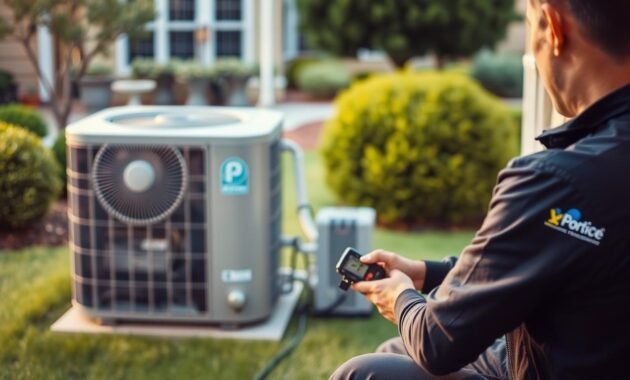
Keeping your air conditioning system safe from electrical problems and overheating is key. As a homeowner, I’ve found that regular checks are vital. They help avoid sudden breakdowns and make your AC last longer.
Professional HVAC techs do more than just look at your AC. They have the skills to spot issues early, saving you from expensive fixes.
- Comprehensive electrical connection evaluation
- Refrigerant level assessment
- Compressor performance analysis
- Overheating protection system check
Regular maintenance brings many benefits:
| Maintenance Frequency | Key Benefits |
|---|---|
| Annually | Prevent major electrical issues |
| Bi-Annually | Optimize system efficiency |
| Quarterly | Early detection of problems |
When picking an HVAC service, check their credentials and reviews. Make sure they know your AC system well. Professional care can save you a lot of money and avoid sudden failures.
DIY Troubleshooting Steps and Safety Precautions
When your AC system has problems like a bad control board or a faulty condenser fan, knowing how to safely find the issue can save you money and time. I’ll show you some basic steps to help figure out what’s wrong before you call a pro.
Start with simple checks that might solve your AC’s problems right away.
Initial Assessment Steps
- Check air filter condition and replace if dirty
- Inspect thermostat settings and battery
- Clear debris around outdoor condenser unit
- Verify circuit breaker status
- Listen for unusual sounds during startup
Professional Intervention Warning Signs
Some AC problems need a pro’s touch. Look out for these signs that mean you should get help:
| Warning Sign | Potential Issue |
|---|---|
| Repeated short cycling | Possible defective control board |
| Burning electrical smell | Potential wiring or component failure |
| Condenser fan not spinning | Condenser fan malfunction |
Safety Guidelines
- Always disconnect power before investigating electrical components
- Wear protective gloves and safety glasses
- Do not attempt repairs beyond basic troubleshooting
- Contact a licensed HVAC technician for complex issues
While DIY troubleshooting can spot small problems, for big repairs, you really need a pro. Always put safety first and know your limits when fixing AC issues.
Read also: Air Conditioner Compressor Keeps Shutting Off
Conclusion
Figuring out why your AC compressor shuts off quickly can save you a lot of time and money. I’ve learned that most cooling system issues come from not keeping up with maintenance and ignoring warning signs. When your AC compressor starts cycling on and off quickly, it’s a sign that something’s wrong.
Being proactive is key. Make sure to check your air filters, keep the refrigerant levels right, and get your system checked by a pro regularly. I’ve seen many homeowners avoid costly repairs by keeping an eye on their system and fixing problems early.
Things like bad electrical connections, wrong thermostat settings, and blocked airflow can cause your AC to shut off fast. While you can try some fixes yourself, some problems need a pro. If your AC keeps giving you trouble, call a certified HVAC tech to find and fix the issue.
Your home’s comfort and your AC’s life depend on knowing these important maintenance tips. By staying informed and taking action, you’ll keep your AC running well all summer. This will make your home cool and comfy.
